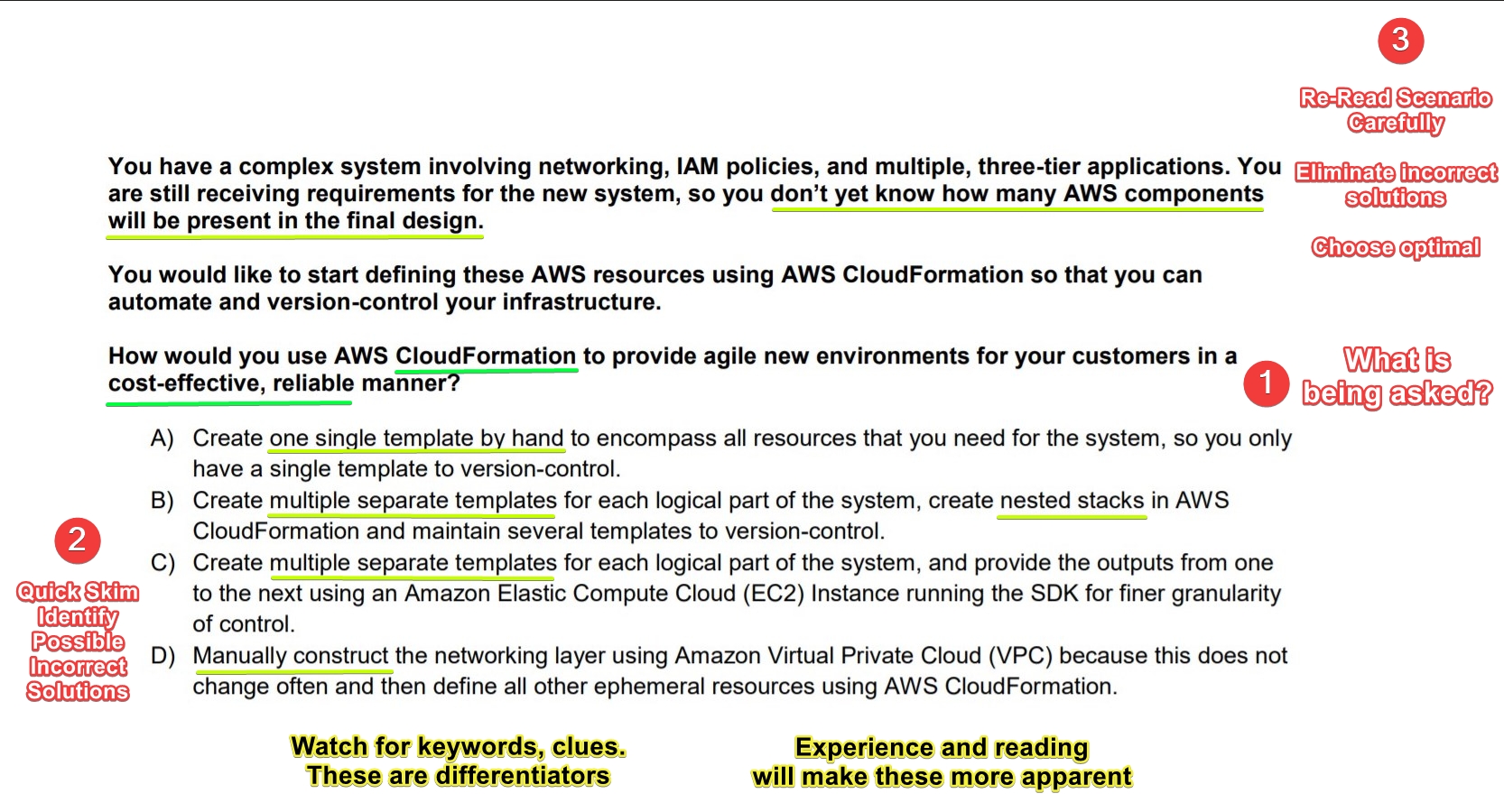When it comes to completing difficult exams such as AWS Professional and Specialty certifications, it’s important to master two components:
- The necessary technical skills being tested
- The ability to quickly learn and process information, make decisions under pressure, and eliminate costly, inefficient solutions
In previous posts, I have talked about the first component. Today we’re going to be talking about the second one.
Anatomy of a Scenario
In the more advanced exams (and in some of the associates) – questions will primarily revolve around complex real-world scenarios. Your objective is to find the best solution(s) that meet the problem statement. These questions can be long. Very long. Repeating this for 60-80 questions can be fatiguing, to say the least. As fatigue grows you make mistakes and it becomes harder to make the right decisions. I’m going to teach you how to break this down quickly in order to delay the onset of this fatigue and help you get through the exam with time to spare.
Read the ‘question’ first, not the scenario. The question is typically comprised of the last sentence(s) in a scenario,
Next, skim the answers – look out for ones that are clearly wrong. Typically there are two of these, and two that are plausible. Then carefully read the scenario so that you can narrow down the most correct answer. Note that in Professional exams the answers are more shades of gray than black and white.
Source: AWS Official Sample Questions – DevOps Professional
On that note, for your exam – be sure to review the AWS Sample Questions and Exam Guide. Gear your preparation around that. The key here is to practice this and reduce fatigue and mistakes you can make. Learn to spot flaws, learn to manage and optimize your energy levels and comprehension – vital skills you will need in the field. When you are presented with an overwhelming amount of options, sometimes it is easier to figure out what is wrong, or costly, or overengineered, and cross that off your list, then to try to find the perfect solution first.
As I have mentioned in other posts, If English is not your first language, be sure to request accommodations before you schedule your exam – you may be allotted extra time.
Speed Reading
I advise practicing reading. A lot. As much as you can. You need to get into a test taking mindset, practice and train. This translates well to the real world as a Solutions Architect, DevOps Professional, or AWS Specialist as you have to be able to break down complex scenarios quickly, consume rapidly changing documentation, and make the best choices. Reading whitepapers, documentation, case studies, do a little each day and train it as you would a muscle. Be careful not to sound out every single word too slowly as you read – subvocalization is normal, but try to speed it up a little bit. If you listen to audiobooks or YouTube \ Udemy \ ACloud lectures, try increasing the speed gradually to 1.25x or more. Increase your ability to process information faster. There are resources online as well if you want to delve into this skill further.
What is your learning style?
It helps also to know what is your optimal learning style. In the most general sense, this can be broken down into auditory, visual, and tactile learning. Do you learn best by seeing, hearing, or doing? Think about where you have done your best learning, and how. If you are not sure there are a number of online resources for this. I’m linking a sample one here. A visual learner would benefit from things like flashcards, highlighting and color coding things to help cement those ideas to memory. An auditory learner will get the most benefit from listening to lectures, hearing how things work. A lot of the AWS blogs have both a written and audio format – take advantage of that if you’re more of an auditory learner. A tactile learner will get the most benefit from hands-on training. No one is an all or nothing type of learner, most folks are a mix – take what you learn about yourself, and optimize your environment, time, and study plan to be the most efficient. A quiz to help you discern your learning style is here
Wrap-Up
Build up and use everything in your arsenal, get your plan together – strategize, don’t overthink it or get analysis paralysis…..you do need to sometimes just START. Get the momentum going on your study, and refine your approach as you go. There is no one-size-fits-all study plan. What has worked for me is to layer my learning with a variety of sources – lectures, hands-on, documentation, re:Invent presentations on Youtube. Some of these you can listen to while you multitask, other in small bits of free time, and others do require focused time for deep work. Immerse yourself in the material.
Make a checklist. As you are scouring all these different resouces for information, do take notes – good notes. I like to make a checklist as I find important things I want to review before test time. Make your plan and make it your own. Work backwards from when you want to pass your exam and set your date – plan your study sessions accordingly.
As you find useful things, be sure to note them and follow up before exam day.
Good Luck!
Jorge Rodriguez
Lead Cloud Engineer
[email protected]






